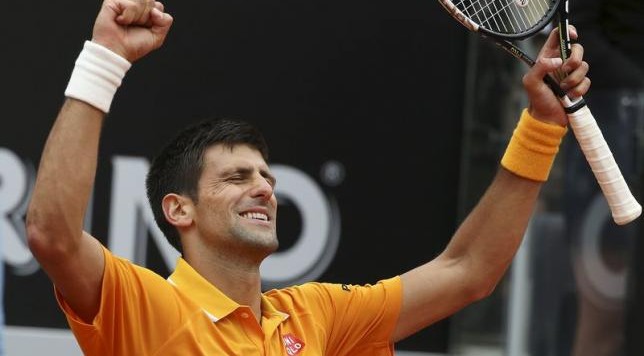There are lies, damn lies, and statistics.
Then again, numbers — while often telling falsehoods and being eternally subject to manipulation — can also reveal powerful truths.
As the Roman road becomes the path to Paris, and the clay Masters 1000 series gives way to the year’s second major tournament, the numbers tell the story of Novak Djokovic’s second ascendancy in men’s tennis. Following a convincing, “more-lopsided-than-the-score-looked” 6-4, 6-3 win over Roger Federer in Sunday’s final, the world No. 1 is showing how much of a distance he’s creating relative to the rest of the field — yes, even that Nadal guy.
It feels a whole lot like 2011 in here.
*
You remember 2011, right? That’s the year when Djokovic posted several numbers as part of a season for the ages, one of the great calendar-year conquests in the Open Era of men’s tennis.
70: number of match wins.
6: number of losses.
10: number of titles won.
3: number of major titles won.
5: number of Masters 1000 titles won.
12.6 million (rounded to the nearest tenth): number of dollars won.
39: number of consecutive match wins heading into that year’s French Open.
Djokovic — having emptied his tank at the U.S. Open in an exhausting victory over Nadal in the final — didn’t dominate the fall indoor season or the year-ending ATP World Tour Finals. Yet, his January-through-September run marks a nine-month stretch which will retain a permanent place in the tennis pantheon.
Fast-forward to 2015.
What do the numbers say on May 17 of the year, with only one major tournament in the books?
35 wins.
2 losses.
5 titles — winning the only major of the year (so far) and four of the five Masters 1000 events.
1: number of Masters 1000 titles Djokovic has failed to win… and that’s because he didn’t enter the Madrid Masters event.
0: number of losses in majors or Masters 1000 events this year.
22: number of consecutive match wins heading into this year’s French Open.
We’re coming up on the best two months of the tennis season, the months which encompass both Roland Garros and Wimbledon. In the middle of July, following our fortnight spent in the English summer, we’ll all have a far better idea of where Novak Djokovic stands in the larger history of men’s tennis. That said, it is undeniably obvious that Djokovic has a chance to accumulate quite a lot of riches, starting with Paris.
There is an argument to be made that Rafael Nadal is (still) the favorite at the French Open until he loses — that’s an entirely reasonable position, given Nadal’s near-complete ownership of the event for a solid decade, reinforced by his ability to turn back all foes so consistently at Court Philippe Chatrier. Yet, even if you believe in Nadal and “The Citadel,” you have to acknowledge that Rafa’s claim to Roland Garros is never more tenuous entering that Parisian tennis pageant than it is in 2015.
Djokovic has become a Game Of Thrones-caliber fire-breather, a beastmode tennis player devouring opponents left and right. Nadal has failed to win a single clay-court tournament. He wasn’t terrible in his loss to Stan Wawrinka in Friday’s quarterfinals, but his ability to win the most important points — the marker of an elite player at the top of his game, even on days that fall short of complete excellence — has vanished. At least, that knack has disappeared for the moment.
Had Nadal won even one of the three clay Masters events, it would be a million times easier for Nadal to say — not only to Djokovic, but most centrally, to himself — that he has something to build on heading to Paris. Under these circumstances, though, the gap in form between Nadal and Djokovic is substantial. Yes, Nadal could play his way into form through the first four rounds of the French Open, but the idea that he’ll once again attain the airtight consistency which has so regularly entered his game in previous French Open quarterfinals and semifinals is more tenuous this time.
Nadal rolled past Tomas Berdych in the Madrid semifinals. The next day, his game regressed in the final against Andy Murray.
Nadal moved through the first two rounds of this Rome Masters event with relative comfort, but in the quarterfinals — against a major champion — he didn’t elevate his game the way he normally does when a tournament moves from preliminary stages to its latter stages.
Roger Federer enjoyed a quietly good week, making the finals of a tournament he probably wouldn’t have played if he had beaten Nick Kyrgios in Madrid a week earlier. Yet, for all the successes the Swiss enjoyed in Italy, everyone knows that the conversation about Roland Garros begins and ends with the world No. 1 from Serbia and how he compares with the nine-time French Open champion from Mallorca.
Nadal deserves his place at the conversation table — he’s earned that much. Yet, as we leave Rome, Novak Djokovic will moderate the debate, and we’re left to wonder if Nadal will be able to deliver a stinging retort over two weeks from now.

